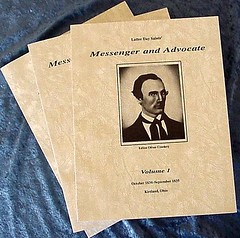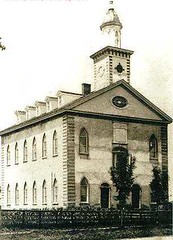Big Love's Gay Marriage --To No Marriage
It's getting tougher to laugh off the "slippery slope" argument — the claim that gay marriage will lead to polygamy, polyamory, and ultimately to the replacement of marriage itself by an infinitely flexible partnership system. We've now got a movement for legalized polyamory and the abolition of marriage in Sweden. (See "Fanatical Swedish Feminists.") The Netherlands has given legal, political, and public approval to a cohabitation contract for a polyamorous bisexual triad. (See "Here Come the Brides.") Two out of four reports on polygamy commissioned by the Canadian government recommended decriminalization and regulation of the practice. (See "Dissolving Marriage.") And now comes Big Love, HBO's domestic drama about an American polygamous family.Kurtz points out that even the Big Love cast feels there are deeper social issues at stake, beyond providing American homes with entertainment:
Speaking to The Washington Blade, Olsen said he and Scheffer wanted to address our culture war over the family by trying to "find the values of family that are worth celebrating separate of who the people are and how they're doing it." In other words, family structure shouldn't matter as long as people love each other. Scheffer adds that what attracted him to the Big Love project was "the subversive nature of how we deal with family values....I think what's really exciting about the show is the nonjudgmental look we have on our characters." Now maybe cultural radicals are mistaken when they claim that they can change society just by shaping the movies, plays, and television we watch. But clearly this kind of cultural transformation is exactly what Scheffer and Olsen have in mind.
It isn't just Big Love's co-creators who think of it as something that will influence our cultural, legal, and political battles. Big Love's actors seem to feel the same way. Ginnifer Goodwin, who plays one of the wives of Big Love, says that for many women, polygamy "is the answer to their problems, not a problem in and of itself." Big Love lead, Bill Paxton, says: "This show talks about the freedom in this country. Are we free to choose who with want to live with? Well, yes, but we can't have legal rights together." Paxton seems to be pretty clearly arguing for decriminalization of polygamy, and probably for direct legal recognition as well.
This is where Kurtz points out he is merely taking the folks behind Big Love at their word. He also highlights a story from yesterday's Salt Lake Tribune discussing whether the "polygamy debate" will ever be the same again:
We don't need to talk about all the claims for the cultural significance of Will and Grace or Brokeback Mountain. Have a look at this fascinating piece from the Salt Lake City Tribune, "Will the polygamy debate ever be the same?" The Tribune draws an analogy between Big Love and the first appearance by a black in a television commercial. That appearance was arranged by Vice President Hubert H. Humphrey, through his then intern, Ed Frimage. Now a law-professor emeritus at University of Utah's law school, Frimage has long advocated the decriminalization and regulation of polygamy. Once you get an black on television to sell refrigerators, argues Frimage, "the game is over." The Salt Lake Tribune wonders out loud whether, after Big Love, the same might now be true for polygamists. As the Tribune reports, there are already legal challenges to anti-polygamy laws based on the Supreme Court's Lawrence v. Texas decision. It's likely we'll see more in the future. It's hard to believe that changing public attitudes in the wake of Big Love won't have an influence on those battles in years to come.
Over at the Oregon Daily Emerald, writer Ailee Slater also discusses the social and legal implications of the recent Big Love polygamy push by HBO. In part she writes:
When television picks up on not just a set of characters, but an entire lifestyle, there is usually some factor of social fascination at work. “The Sopranos”, “Six Feet Under”, “Desperate Housewives”: Each one of these shows draws its immense audience by exposing them to little-known social realities such as the mob, the undertakers and the wealthy women of suburbia. HBO’s newest lifestyle-turned-television-show just might blow the rest of them out of the water, in terms of viewer curiosity and cultural relevance . . .Polygamy has been forbidden since 1878, when the U.S. Supreme Court ruled that the practice of polygamy violated criminal law, and was not protected under the freedom of religious expression. Although that legal precedent still stands, polygamous relationships are rarely prosecuted; instead, the law tends to focus on punishing the instances of polygamy wherein children are endangered or incest occurs.
Because of the 2003 Lawrence v. Texas case, wherein a gay couple was seen having sex in their apartment and arrested for that act, the Supreme Court has already set a precedent allowing citizens to “engage in private conduct without government intervention.” The prosecution in Lawrence v. Texas was unable to persuade the court that a violation of sodomy law ought to outweigh the right to privacy; similarly, polygamist families and organizations plead their case for legalized polygamy on the basis that the marriage laws themselves are outdated, and that side problems such as statutory rape can be solved through criminal laws . . .
Polygamist families make a convincing argument, especially considering that the reason polygamy was originally prohibited had as much to do with religious oppression as it did marital norms. Joseph Smith, the man who stared at gold plates and translated what they were telling him into the book of Mormon, believed that God had commanded him to take more than one wife and establish the tradition of plural marriage. Although Smith could certainly be termed mentally ill for his belief in this personal connection with God, there is no reason besides religious favoritism that the U.S. legal system chooses to accept the Biblical One Man One Woman norm, yet refuses Smith’s call to polygamy. Historians often comment that the move to outlaw multiple spouses was meant as an attack on the Church of Jesus Christ of Latter-Day Saints, which encouraged polygamy before it was outlawed. (Since then, the church has split into three groups, and the smallest group — fundamentalists — still believe practicing polygamy is OK.)
I think Ms. Slater is spot on in her analysis here, particularly her discussion of frontier America's legal attack on polygamy, and The Supreme Court's outlawing its practice. We are now poised in the "culture wars" to completely deconstruct the traditional family concept of marriage and the very fundamental family unit itself. The Brethren accurately forsaw this as far back as 1995 in their, The Family: A Proclamation to the World. Since that time, and even before we have seen an unprecedented assault on the family, and the institution of marriage, the consequences of which I don't think will fully be understood for decades to come.
Justice Scalia, with whom I often disagree, I think got it right in his Lawrence dissent where he noted among other things:
This reasoning leaves on pretty shaky grounds state laws limiting marriage to opposite-sex couples. Justice O’Connor seeks to preserve them by the conclusory statement that “preserving the traditional institution of marriage” is a legitimate state interest. Ante, at 7. But “preserving the traditional institution of marriage” is just a kinder way of describing the State’s moral disapproval of same-sex couples. Texas’s interest in §21.06 could be recast in similarly euphemistic terms: “preserving the traditional sexual mores of our society.” In the jurisprudence Justice O’Connor has seemingly created, judges can validate laws by characterizing them as “preserving the traditions of society” (good); or invalidate them by characterizing them as “expressing moral disapproval” (bad).
Today’s opinion is the product of a Court, which is the product of a law-profession culture, that has largely signed on to the so-called homosexual agenda, by which I mean the agenda promoted by some homosexual activists directed at eliminating the moral opprobrium that has traditionally attached to homosexual conduct. I noted in an earlier opinion the fact that the American Association of Law Schools (to which any reputable law school must seek to belong) excludes from membership any school that refuses to ban from its job-interview facilities a law firm (no matter how small) that does not wish to hire as a prospective partner a person who openly engages in homosexual conduct. See Romer, supra, at 653.
One of the most revealing statements in today’s opinion is the Court’s grim warning that the criminalization of homosexual conduct is “an invitation to subject homosexual persons to discrimination both in the public and in the private spheres.” Ante, at 14. It is clear from this that the Court has taken sides in the culture war, departing from its role of assuring, as neutral observer, that the democratic rules of engagement are observed. Many Americans do not want persons who openly engage in homosexual conduct as partners in their business, as scoutmasters for their children, as teachers in their children’s schools, or as boarders in their home. They view this as protecting themselves and their families from a lifestyle that they believe to be immoral and destructive. The Court views it as “discrimination” which it is the function of our judgments to deter. So imbued is the Court with the law profession’s anti-anti-homosexual culture, that it is seemingly unaware that the attitudes of that culture are not obviously “mainstream”; that in most States what the Court calls “discrimination” against those who engage in homosexual acts is perfectly legal; that proposals to ban such “discrimination” under Title VII have repeatedly been rejected by Congress, see Employment Non-Discrimination Act of 1994, S. 2238, 103d Cong., 2d Sess. (1994); Civil Rights Amendments, H. R. 5452, 94th Cong., 1st Sess. (1975); that in some cases such “discrimination” is mandated by federal statute, see 10 U.S.C. § 654(b)(1) (mandating discharge from the armed forces of any service member who engages in or intends to engage in homosexual acts); and that in some cases such “discrimination” is a constitutional right, see Boy Scouts of America v. Dale, 530 U.S. 640 (2000).
Let me be clear that I have nothing against homosexuals, or any other group, promoting their agenda through normal democratic means. Social perceptions of sexual and other morality change over time, and every group has the right to persuade its fellow citizens that its view of such matters is the best. That homosexuals have achieved some success in that enterprise is attested to by the fact that Texas is one of the few remaining States that criminalize private, consensual homosexual acts. But persuading one’s fellow citizens is one thing, and imposing one’s views in absence of democratic majority will is something else. I would no more require a State to criminalize homosexual acts–or, for that matter, display any moral disapprobation of them–than I would forbid it to do so. What Texas has chosen to do is well within the range of traditional democratic action, and its hand should not be stayed through the invention of a brand-new “constitutional right” by a Court that is impatient of democratic change. It is indeed true that “later generations can see that laws once thought necessary and proper in fact serve only to oppress,” ante, at 18; and when that happens, later generations can repeal those laws. But it is the premise of our system that those judgments are to be made by the people, and not imposed by a governing caste that knows best.
One of the benefits of leaving regulation of this matter to the people rather than to the courts is that the people, unlike judges, need not carry things to their logical conclusion. The people may feel that their disapprobation of homosexual conduct is strong enough to disallow homosexual marriage, but not strong enough to criminalize private homosexual acts–and may legislate accordingly. The Court today pretends that it possesses a similar freedom of action, so that that we need not fear judicial imposition of homosexual marriage, as has recently occurred in Canada (in a decision that the Canadian Government has chosen not to appeal). See Halpern v. Toronto, 2003 WL 34950 (Ontario Ct. App.); Cohen, Dozens in Canada Follow Gay Couple’s Lead, Washington Post, June 12, 2003, p. A25. At the end of its opinion–after having laid waste the foundations of our rational-basis jurisprudence–the Court says that the present case “does not involve whether the government must give formal recognition to any relationship that homosexual persons seek to enter.” Ante, at 17. Do not believe it. More illuminating than this bald, unreasoned disclaimer is the progression of thought displayed by an earlier passage in the Court’s opinion, which notes the constitutional protections afforded to “personal decisions relating to marriage, procreation, contraception, family relationships, child rearing, and education,” and then declares that “[p]ersons in a homosexual relationship may seek autonomy for these purposes, just as heterosexual persons do.” Ante, at 13 (emphasis added). Today’s opinion dismantles the structure of constitutional law that has permitted a distinction to be made between heterosexual and homosexual unions, insofar as formal recognition in marriage is concerned. If moral disapprobation of homosexual conduct is “no legitimate state interest” for purposes of proscribing that conduct, ante, at 18; and if, as the Court coos (casting aside all pretense of neutrality), “[w]hen sexuality finds overt expression in intimate conduct with another person, the conduct can be but one element in a personal bond that is more enduring,” ante, at 6; what justification could there possibly be for denying the benefits of marriage to homosexual couples exercising “[t]he liberty protected by the Constitution,” ibid.? Surely not the encouragement of procreation, since the sterile and the elderly are allowed to marry. This case “does not involve” the issue of homosexual marriage only if one entertains the belief that principle and logic have nothing to do with the decisions of this Court. Many will hope that, as the Court comfortingly assures us, this is so.
The matters appropriate for this Court’s resolution are only three: Texas’s prohibition of sodomy neither infringes a “fundamental right” (which the Court does not dispute), nor is unsupported by a rational relation to what the Constitution considers a legitimate state interest, nor denies the equal protection of the laws. I dissent.
So, after all this discourse, where am I in all this? I have very strong feelings that the traditional family is the critical unit in the makeup of society. I believe that the traditonal family, and traditional marriage as defined as between one man and one woman is under a ferocious assault from the forces of evil. I believe that part of this assault to a degree is contained within the HBO series Big Love for the arguments presented in the authors cited in this post. Still, I enjoy watching the series, or at least enjoyed the first episode. I will likely watch future episodes to see where it takes the story line.
I am curious about almost all things Mormon, and LDS. I have read authors and pieces not at all complimentary to the Church, yet I rationalize this by thinking I can and do set apart certain ideas, writings, or entertainment programs from my core beliefs and thinking of right and wrong. I don't know if this is entirely consistent--but I am at times an inconsistent person. I suppose like most, I am a work in progress, and like the Prophet Joseph, I am being molded and shaped in life as my rough edges are worn and polished as I roll through life.







3 Comments:
10 *headdesk*
20 Read some more...
30 *repeat* (goto 10)
Sorry Naiah . . .I don't get it.
Blain gets the gold star--on both counts. So, I guess that's two gold stars. (the sentiment & the nonsequitor BASIC format)
Post a Comment
<< Home